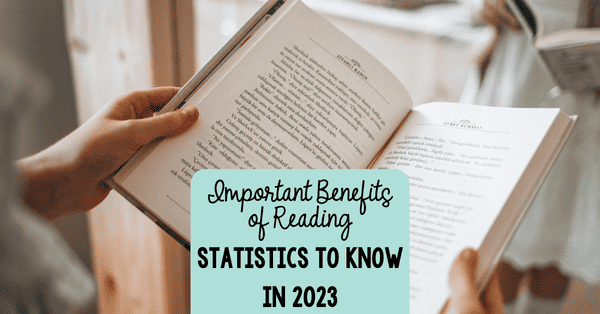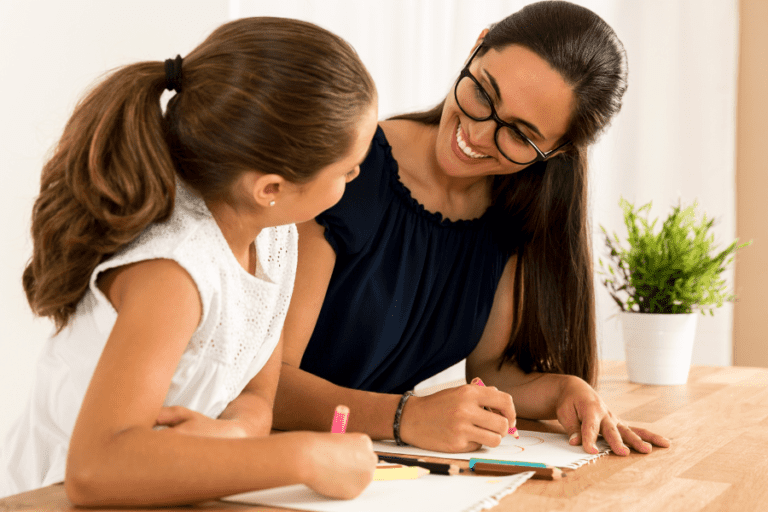This post is all about different questions for children while reading.
QUESTIONS FOR CHILDREN WHILE READING Together

Asking questions to your child while reading can increase their reading comprehension skills. It also boosts their critical thinking skills and provides a great opportunity for conversation that may not typically happen.
While you’re reading a story to your child, do you find that you’re simply just…reading? Silly question, right? Here’s what that might look like. You’re reading the texts out loud and turning the pages. But… there’s no conversation between you and your child!
So, what should you do? Ask some questions! And they don’t have to be too complicated. Need some ideas on what types of questions to ask during story time? Here are some great questions to ask your child while reading.

*This post contains affiliate links.
Why Asking Questions is Important
The Benefits of Asking Questions While Reading
Asking questions helps improve comprehension
Asking questions to your child while reading a book is not only a fun way to start a new conversation, but it also is a big tool when it comes to helping your child comprehend different texts.
Asking Questions Helps improve focus while listening to a story
When you ask your child questions while reading, you are helping them stay focused, understand the story a bit better, and make personal connections to the story. Those are all big things when it comes to reading comprehension!
There is research that shows that when children are actively engaged while reading a story, they are more likely to not only remember the story but also remember key details and new vocabulary learned.
Questions help children make connections to the story
Children have the chance to relate the story to themselves when parents ask questions while reading. This is called making connections. When a child can make personal connections to a text, guess what happens? They will be able to understand it better!
Don’t be afraid to ask questions while you are reading to your child. It’s a great thing to do. Encourage them to think critically and make personal connections to the text. With your guidance and support, your little reader will surely begin to develop those skills needed to continue to grow as a skilled and confident reader.
Are you ready to see what kind of questions to ask while reading to your child are the best?

Questions to Ask Before Reading
“What DO YOU THINK THIS BOOK WILL BE ABOUT?”
When you ask this question, you’re indirectly asking your child to predict the book. That means your child will be guessing what the plot of the story will be.
Have your child look at the cover of the book to make their prediction. Notice what the characters are doing. Can we figure out what they’ll be doing based on the illustrations on the cover? Maybe! If not, it’s still fun to make some guesses.
For example, let’s consider the cover of the popular children’s book, “No, David!” as seen below.
We figure out a few key things from the title and the illustrations here! First, we quickly discover that the little boy’s name is David. It’s in the title of the book after all! Also, we can predict that David may up to be no good! He’s trying to knock over the fish bowl!
“Who do you think the characters will be?”
This question will help your child focus on the main character of the book. When they can identify the characters, their understanding of the plot will get better.
If your child has not yet learned about characters, you can quickly explain that the characters are the people or the animals in the book. Keep it simple and ask: “Who do you think that is?”
“Do you know anything about (book topic)?”
When we ask our children what they already know about, we are activating their prior knowledge. That means you’re connecting what you already know to what you are reading. As a reader, you are using your personal experiences about a certain topic to better understand newer information.
This is a great question to ask while reading informational books about holidays, animals, or historical figures.
Think about this book about elephants. If your child is an elephant lover like mine, they will know so many interesting things about elephants already! What a fun opportunity to hear what your child already knows about a certain topic.
“Do you have any questions before we start the book?”
This type of question isn’t particularly open-ended so you may just get a simple “Nope!” from your child and be ready to move on. That is completely okay!
But, your child may be quite curious about the book at this point! Answer any last-minute questions they have and then get reading.
Questions to Ask During Reading
“Why Do you think the character did that?”
This type of question gives a great opportunity to help your child think about the character’s intentions, wants, and the actions they may have taken to get something they want.
Did their actions make someone feel special? Or were their actions a bit rude and was someone else left feeling hurt?
“What If Everybody Did That?” is a book that helps children see how little actions can have big consequences.
“HOW DO YOU THINK THE CHARACTER IS FEELING?”
Identifying emotions is an important thing to learn for children of all ages. The reason why identifying emotions is important is that being able to name the feelings we have better helps our children regulate themselves.
If your child is struggling with identifying emotions, you can help your child by having them look at the illustrations.
“How is the character’s face looking?
Oh, do you see how his brow is all scrunched up?
That looks like an angry face! He must be feeling pretty mad!”
If you’re looking for a few books that feature colorful illustrations about emotions, here are a few of my favorites:
“WHAT DO YOU THINK THAT WORD MEANS?”
This is a great question to build your child’s vocabulary. Children will learn many new words from reading stories since a lot of words in stories typically do not appear in everyday conversation. That’s why reading to your child is so important! Exposure to new words is key when it comes to vocabulary development!
“The CHARACTER IS FEELING [EMOTION]. CAN YOU THINK OF WHEN YOU FELT THAT WAY?”
To help your child make personal connections to the text, asking a question like this is perfect. Not only will it help them make connections to the book, but this type of question will also let you into a little personal moment in their life.
If your child can’t think of a time when they felt a specific way, you are more than welcome to share a time in your life.
These are the types of conversations that are so precious during story time. It’s hard to talk about these feelings throughout our day. That is why books provide such a great segway into conversation, bonding, and more.
“The Day the Crayons Quit” gives a funny point of view from some very frustrated crayons! This story is a great addition if you’re looking to work on thinking from different perspectives.
Questions to Ask After Reading
“What was your favorite part of the book?”
When you ask your child what their favorite part of the story was, you are helping them reflect on what they enjoyed most about the story. Taking the time to think about the story helps your child to remember the details of the characters and the main events.
This type of question also provides an opportunity for your child to express their likes and dislikes about a specific book.
“What did you learn from the story?”
So many books provide learning opportunities – whether that be a new fact we learned or a lesson delivered from the characters. Having your child share what they learned from the story lets them reflect and connect to the story.
Here are some wonderful children’s books that have important life lessons.
“How did the story make you feel?”
This a great question to wrap up your storytime together. We often read books to make us feel happy, but sometimes books may leave us feeling a little sad – and that’s okay!
“Would you want to read this story again?”
Sometimes we read a story and we really love it! Other times, we read a story and have no interest in reading it again. As adults, we have our own preferences when it comes to reading. It’s important that our children understand that they can have their own preferences also.











2 Comments
Comments are closed.